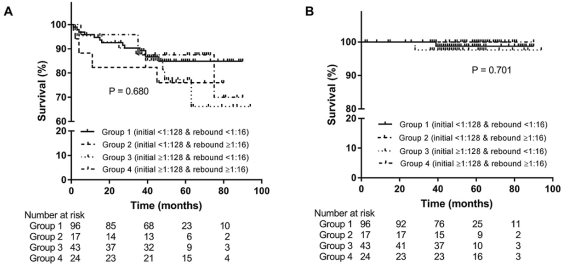Decreased Clinical Significance of Isoagglutinin Titer with the Current Desensitization Protocol in ABO-Incompatible Kidney Transplantation
Department of Internal Medicine, Division of Nephrology, Asan Medical Center, Seoul, Republic of Korea
Department of Surgery, Asan Medical Center, Seoul, Republic of Korea.
Meeting: 2018 American Transplant Congress
Abstract number: A143
Keywords: Immunosuppression, Isoantibodies, Kidney transplantation
Session Information
Session Name: Poster Session A: Kidney Immunosuppression: Desensitization
Session Type: Poster Session
Date: Saturday, June 2, 2018
Session Time: 5:30pm-7:30pm
 Presentation Time: 5:30pm-7:30pm
Presentation Time: 5:30pm-7:30pm
Location: Hall 4EF
ABO-incompatible (ABOi) kidney transplantation (KT) has become a routine procedure with graft survival rates comparable to those of ABO-compatible KT. However, the clinical significance of the isoagglutinin titer in ABOi KT remains uncertain. Therefore, in this study, we analyzed the clinical outcomes of ABOi KT according to the baseline and postoperative isoagglutinin titer.
All patients who received ABOi KT between 2009 and 2013 were reviewed and followed up until December 2016. The patients were classified according to baseline (<1:128 or ≥1:128) and postoperative rebound isoagglutinin titer (<1:16 or ≥1:16), and the clinical outcomes of KT were compared.
Patients with a high baseline isoagglutinin titer showed a poor titer reduction rate (1.48 ± 0.41 vs. 1.32 ± 0.34, P = 0.008), and more patients experienced titer rebound ≥ 1:16 after KT (15.0% vs. 35.8%, P = 0.002). The occurrence of both T-cell mediated rejection and antibody-mediated rejection did not show a significant difference (P = 0.805 and 0.714, respectively). The rate of rejection-free survival was not different among groups (P = 0.680, log-rank test). Furthermore, the rate of death-censored graft survival was not different among groups (P = 0.701, log-rank test). Urinary tract infection was the most frequently reported infectious complication overall. The incidence of urinary tract infection, pneumonia, and viral infections (BK virus and cytomegalovirus) was not different among groups. 
In conclusion, high baseline isoagglutinin titer was associated with a high rebound isoagglutinin titer, low titer reduction rates, and more sessions of plasmapheresis. However, the isoagglutinin titer may not be as important as it was in the past in ABOi KT, if appropriate desensitization is performed.
CITATION INFORMATION: Baek C., Kim H., Yang W., Han D., Park S-.K. Decreased Clinical Significance of Isoagglutinin Titer with the Current Desensitization Protocol in ABO-Incompatible Kidney Transplantation Am J Transplant. 2017;17 (suppl 3).
To cite this abstract in AMA style:
Baek C, Kim H, Yang W, Han D, Park S-K. Decreased Clinical Significance of Isoagglutinin Titer with the Current Desensitization Protocol in ABO-Incompatible Kidney Transplantation [abstract]. https://atcmeetingabstracts.com/abstract/decreased-clinical-significance-of-isoagglutinin-titer-with-the-current-desensitization-protocol-in-abo-incompatible-kidney-transplantation/. Accessed January 9, 2026.« Back to 2018 American Transplant Congress
